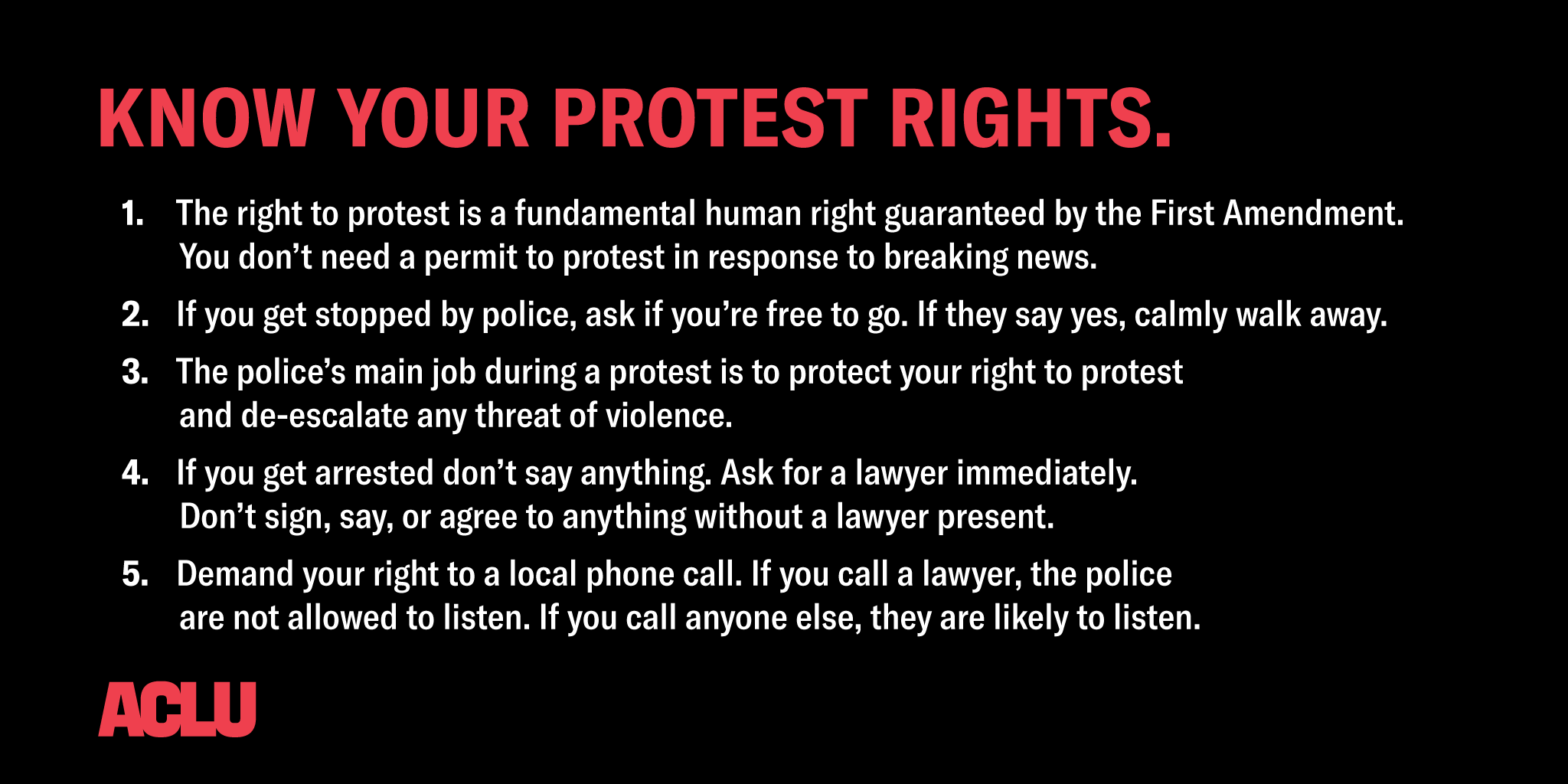Free Speech in Public Universities
- The First Amendment protects the rights of students in public colleges and universities to express their opinions, even if others disagree with the views expressed or the form of expression.
- Public Universities are still allowed to set reasonable, viewpoint-neutral, rules related to the time, place, and manner of student speech. For example, a speech or rally that might be permissible in a park may be restricted if made in the reading room of a library. They can also restrict speech that directly calls for immediate, lawless action, such as threatening or presenting “substantial disruptions” to campus such as blocking entryways and exits for buildings on campus, causing property damage, and endangering the safety of others. To be restricted, “threatening” speech must be clear, unambiguous and immediate; political hyperbole does not rise to the level of true threats.
- Students have a constitutional right to engage in peaceful marches and demonstrations, wear symbolic clothing, coordinate boycotts, and any other expressive actions as long as they don’t violate the school’s narrowly tailored time, place, and manner rules.
- Public universities cannot deny recognition to student groups for being associated with a controversial organization or for having controversial opinions.
- Public universities cannot limit or deny recognized student groups from communicating with students, faculty, and administration. They also cannot deny funding, resources, or services that are generally accessible because they disagree with the group’s viewpoint. However, public universities can deny recognition or otherwise stop student group activities when those activities violate reasonable campus rules, interrupt classes, or substantially interfere with the opportunity for students to learn. This is a high bar. Public universities cannot shut down a student group without having substantial evidence to show that their activities break campus rules or cause substantial disruption.
- Public colleges and universities can invite whomever they like to speak at commencement ceremonies or other events, just as students are free to protest speakers they find offensive.
- University administrators cannot dictate which speakers students may invite to campus. If a college or university usually allows students to use campus resources (such as auditoriums) to entertain guests, the school cannot withdraw those resources simply because students have invited a controversial speaker to campus.
- Symbols of hate are constitutionally protected if they’re worn or displayed before a general audience in a public place — say, in a march or at a rally in a public park. But the First Amendment does not protect the use of nonverbal symbols to directly threaten an individual, such as by hanging a noose over their dorm room door. Nor does the First Amendment protect the use of a non-verbal symbol to encroach upon or desecrate private property, such as by burning a cross on someone’s lawn or spray-painting a swastika on the wall of a synagogue or dorm.
- Public universities have no obligation to fund student publications; however, if a public university voluntarily does so, it cannot selectively withhold funds from particular student publications because they advocate a controversial point of view.
Free Speech in Private Universities
- Private universities generally are not bound by the First Amendment. So, private school students do not have the same freedom of speech rights as public school students. A private school student’s free speech rights are generally described in the university’s rules and student conduct code.
- Your private college or university can discipline you for your speech if it determines that the speech violates university rules.
- Private universities are required to substantially comply with their own policies regarding the formation and shutting down of student groups.
- To locate your school’s rules, code of conduct and disciplinary process, search your school’s website or reach out to the administration, such as your office of student affairs or your registrar. Read the code and any additional policies related to web use, free expression, event coordination, and bias/harassment.
Discrimination and Harassment
All students are entitled to equal access to education — free from harassment and discrimination on campus. Public and private universities are bound by civil rights laws to protect students from discriminatory harassment on the basis of protected characteristics, including race and national origin. So, while offensive and even racist speech is constitutionally protected, racist speech directed at a particular student can constitute impermissible harassment, not free speech.
Privacy
The Family Educational Rights and Privacy Act (FERPA) prohibits universities that receive funding from U.S. Department of Education programs – which generally covers both public and private universities – from disclosing many types of student information without your consent if you are 18 and over. The law does allow a school to share “directory information” like a student’s name, address, telephone number, degrees, awards, and participation in activities and sports.

Stay Informed
Sign up to be the first to hear about how to take action.
By completing this form, I agree to receive occasional emails per the terms of the ACLU’s privacy statement.
By completing this form, I agree to receive occasional emails per the terms of the ACLU’s privacy statement.


